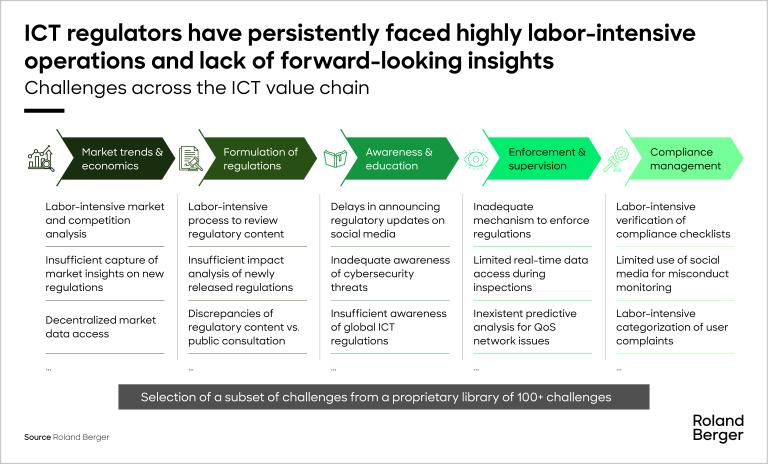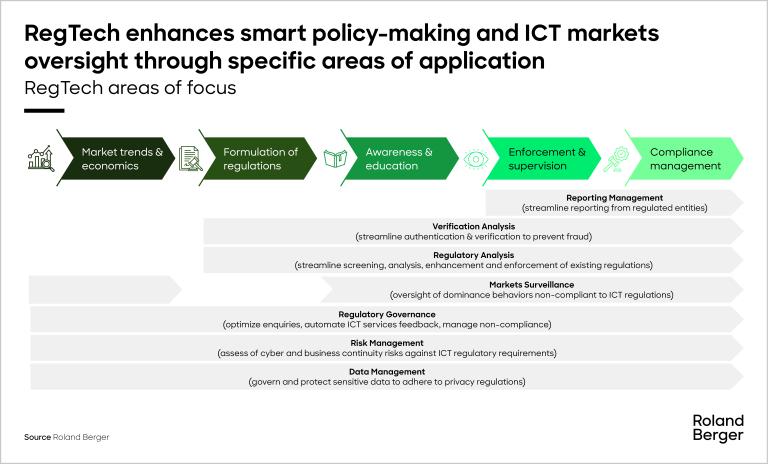Insights on network decommissioning


Unleashing the potential of RegTech for enhanced ICT regulation
By Jawad Shaikh
How RegTech is shaping the future of compliance and oversight

In the ever-evolving world of Information and Communication Technology (ICT), regulatory bodies consistently encounter multiple challenges that hinder their ability to deliver on their ever-expanding and ever-more complex mandates. To better understand these obstacles, Roland Berger engaged with global and regional ICT regulators, uncovering over 100 specific challenges that impede their performance. The primary concern that emerges is the reliance on highly labor-intensive, manual processes, which not only slow down operations but also prevent regulators from proactively addressing emerging trends in the fast-paced ICT sector.

The emergence of RegTech as a solution
Recognizing the need for technological advancement, ICT regulators are increasingly turning to Regulatory Technologies (RegTech). RegTech is defined as the application of nascent and emerging advanced technologies that enable regulators to fulfill their mandates of policymaking, oversight, supervision, and compliance monitoring and enforcement efficiently and effectively. This shift not only aids regulators but also helps regulated companies in fulfilling their compliance and reporting obligations with greater efficiency and precision.

Our team has pioneered a comprehensive RegTech taxonomy specifically designed for the ICT sector. This taxonomy pinpoints seven key application areas that can significantly enhance regulator functions, such as reporting management, verification analysis, regulatory governance, market surveillance, data management, risk management, and regulatory analysis. For instance, advancements in reporting management facilitate a more streamlined process, allowing regulators to enhance enforcement and compliance management effectively.
_image_caption_none.png)
Roland Berger conducted thorough market research combined with the use of a large language model (LLM) to evaluate the offerings of over 1,000 RegTech vendors. This extensive analysis has enabled us to identify and categorize over 6,000 RegTech solutions. These solutions are clustered around key regulatory domains, creating a user-friendly system that helps ICT regulators easily identify and implement the technologies that best meet their specific needs and regulatory challenges.
Defining and addressing key use cases
The potential of RegTech can be harnessed by defining use cases that identify specific challenges and address them with targeted technological solutions. Roland Berger has collaborated with leading regulatory authorities to define over 20 specific RegTech use cases that have broad applicability for ICT regulators globally. These use cases focus on two primary areas:
- Expedited policymaking: Technologies that streamline the policy-making process, enabling ICT regulators to adapt more swiftly and responsively to changes in the ICT landscape.
- Enhanced oversight: Technologies that improve the ability of ICT regulators to monitor, identify, and address issues, ensuring effective oversight and enforcement.
4_image_caption_none.png)
"RegTech isn't just a tool, it's a transformative force that empowers regulators to be more efficient in the formulation and enforcement of regulations, as well as in their ability to anticipate challenges and adapt rapidly, ensuring that compliance is as dynamic and progressive as the technologies it governs."
Benefits of implementing RegTech
The advantages of adopting RegTech solutions are significant and multifaceted. These technologies enhance human resource efficiency by streamlining manual processes, thus allocating more resources toward strategic oversight activities. Additionally, they enhance compliance management with more precise and timely data, coupled with the accelerated processing of regulatory texts. This acceleration allows regulators to respond more swiftly to changes and new demands within the sector.
The specific benefits of RegTech can vary depending on the particular market and regulatory environment; however, Roland Berger has performed a high-level quantification based on insights gathered from executives of leading ICT regulatory authorities and Roland Berger’s RegTech efficiency levers database to offer some directional guidance on what RegTech can achieve:
- Time Efficiency: The time needed to complete core regulatory processes is reduced by approximately 45%, significantly speeding up operational workflows.
- Increased Output: Regulators can achieve about a 50% increase in the volume of regulatory output they are able to manage within the same timeframe, enhancing productivity.
- Accuracy and Precision: The precision and correctness of outputs from core regulatory processes see an improvement of around 60%, reducing errors and increasing reliability.
- Cost Efficiency: The implementation of RegTech can lead to around a 35% reduction in the costs associated with executing core regulatory functions, providing substantial financial savings.
5_image_caption_none.png)
These quantified benefits underscore the transformative potential of RegTech solutions in reshaping the landscape of ICT regulation, making regulatory processes not only faster but also more cost-effective and accurate.
The RegTech market is growing rapidly
The RegTech market is experiencing significant growth, driven by the need for more efficient regulatory processes and the increasing complexity of the ICT sector. In 2023, the market for RegTech solutions was estimated at USD 14 billion, and it is projected to grow at a compound annual growth rate (CAGR) of approximately 18% over the next decade, potentially reaching nearly USD 69 billion by 2032 1. This growth underscores the vast opportunities for technology companies to innovate and develop solutions that support ICT regulators.
Roland Berger as your strategic partner for RegTech
- Defining impactful RegTech use cases: We work with you to identify and articulate the most effective RegTech solutions that address your specific challenges.
- Prioritization for maximum impact: We evaluate the technical feasibility and potential impact of various RegTech options, helping you to prioritize those solutions that promise the greatest value.
- Developing a roadmap for implementation: We aid in defining the operating model and governance structure for the selected RegTech solutions and establish a clear and actionable roadmap for implementation.




_person_144.png)